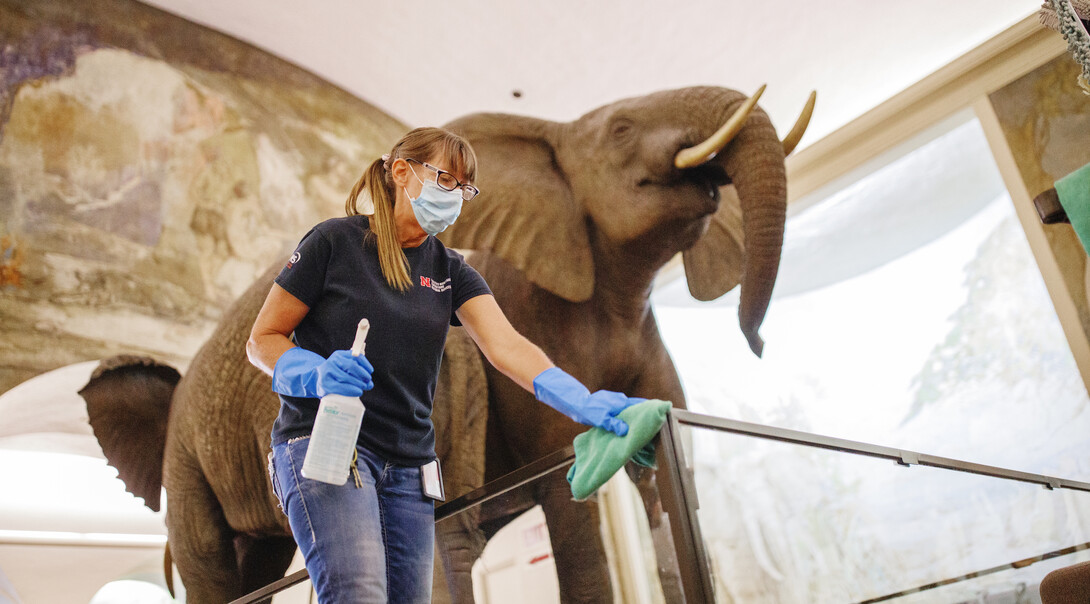
February feels a world away now, but Estelle DeJonge clearly remembers the sense of urgency.
As it became clear that COVID-19 was spreading in the United States, DeJonge, assistant director of Custodial Services, began working with custodial staff to develop what would be a continuously changing list of new routines and procedures to help keep the University of Nebraska–Lincoln campuses safe.
The first priority was to protect the university’s frontline custodial workers.
“Almost immediately, University Operations implemented a mask policy, and our staff were all required to wear face masks and follow the social distancing recommendations by the Centers for Disease Control to stay six feet apart,” DeJonge said. “Our team assessed our current practices and if the task did not meet the six foot recommendations we made adjustments.”
Hand sanitizing stations were placed in some custodial closets, and all custodial carts were supplied with personal bottles of hand sanitizer — to fill gaps where a restroom might not be available — and reminded staff to wash hands frequently.
DeJonge and her team reviewed schedules and staggered arrival and break times, replaced formal staff meetings with written or digital communication, and implemented numerous protocols, from regularly sanitizing shared keys and other items to realigning chemicals used according to the latest information from the CDC — information Facilities staff monitors every day, with assistance from the university’s Environmental Health Services team.
“We started looking at the chemicals that were approved for killing coronavirus and making sure we had those purchased, which in hindsight, was a really great idea because they were quickly unavailable,” DeJonge said. “And we’ve switched chemicals multiple times based on what is CDC-approved and available.
“Our staff have been really flexible in what has been an ever-changing situation.”
With new protocols in place and with empty campuses, Custodial Services crews took advantage of the spring shutdown to complete periodic tasks like cleaning carpets and refinishing floors, in an effort to prepare for students’ return to campus in the fall, when priorities would shift again.
“We were able to be very efficient and productive in getting those projects done so once classes did come back on campus, we could focus on the increased disinfecting and cleaning protocols that we had put in place,” said Ron Bailey, director of custodial, landscape and materials management.
In August, before in-person instruction began, the custodial staff again adjusted to new routes and protocols, with a focus on continuous, revolving sanitization. With recently-acquired cordless electrostatic misting sprayers, custodial workers quickly disinfected rooms and large areas utilizing a very fine mist of disinfectant solution. Where the sprayers can’t be used, workers wipe down surfaces.
“We’re prioritizing those high-traffic areas where there are large numbers of people coming and going,” DeJonge said. “In addition to our standard disinfecting services, we have six routes on City and East campuses that are designated to disinfect high-touch areas a second time.”
The university’s custodians work around the clock to maintain a safe environment on campus. That work includes every building on campus, aside from Nebraska Unions, University Housing and Campus Recreation, which have their own crews. All high-traffic areas are disinfected twice daily, and the nearly 500 classrooms are sanitized every night — something that was only done once per week prior to the pandemic.
“Our custodial frontline staff has been on campus, working hard, and they’ve done an awesome job,” DeJonge said. “Our staff are dedicated, take their jobs seriously and take pride in their work. I think that shows across campus. They’ve been supportive and positive.”
Their work is paying off as Lincoln-Lancaster Health Department officials have found little to no in-class transmission of the virus since in-person instruction began.
“That’s a testimony to the efforts of the custodial staff and all of the university task forces that have worked relentlessly to provide guidance to all university operations staff supporting our efforts,” Bailey said. “With all of the work — the planning and the implementation — to return to campus, that fact definitely reflects on everyone here.”
International Housekeeper Week will be observed by Custodial Services Sept. 28-Oct. 2. Recognized worldwide, the event is designed to recognize the custodians and housekeepers who protect, preserve and beautify schools, hospitals and businesses. Bailey, DeJonge and Jim Jackson, associate vice chancellor of University Operations, are encouraging faculty, staff and students to acknowledge and thank the university’s custodians, who provide a valuable professional service.







